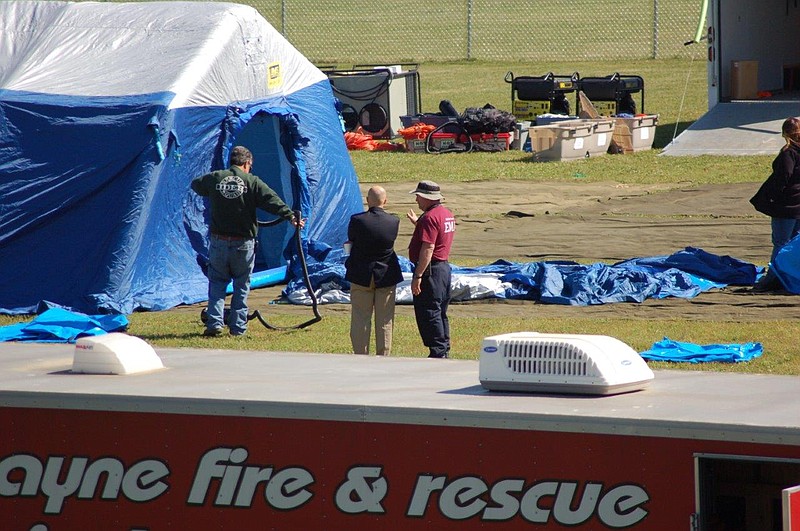Read more
Mobile medical units ready for action in Northeast Alabama
If one can rationalize that disasters have silver linings, then North Alabama's new 50-bed Alabama Department of Public Health mobile hospital aimed at providing medical care quickly during catastrophic emergencies is the halo of a southeastern tornado outbreak here four years ago.
Headquartered in DeKalb County's Fort Payne, the MASH-like station can roll out in three trailers containing inflatable medical stations (think of something akin to the greatly oversized inflatable bounce houses at kids' events). The medical stations can be set up in less than two hours - complete with a week's worth of emergency medical supplies.
"We could have used [something like this] in 2011," Michael Posey, deputy director of the county emergency management agency told Times Free Press reporter Ben Benton. Posey was referring to 2011's deadly twister outbreak that claimed 35 lives in DeKalb county alone and injured between 200 and 300 - far more than medical facilities in Fort Payne could handle at critical emergency speed.
"They could have used it to triage individuals that were injured, and it would have been a good thing to have had during that storm because there was such a large number of patients. It just overwhelmed them," Posey said.
Alabama has seven mobile medical stations. This is the first time one is to be headquartered in Northeast Alabama.
Variations of this mobile field hospital also are scattered over both Tennessee and Georgia.
In Tennessee, state Emergency Preparedness Director Dr. Paul Petersen says the Volunteer State has five similar mobile medical units, each with capacities for 12 to 20 beds (or space for up to 180 patients if officials brought them all together. The units, which cost a total of $525,000 (all purchased with federal preparedness funds, not state dollars), currently are assigned in five regions of the state, including the south central and Cumberland regions that largely encompass our area.
Petersen says some of the units already have seen use for tornado response in West Tennessee, but the mobile ER and triage units aren't set up just in emergencies. Dr. Petersen says the units sometimes are dispatched for planned events with large numbers of people, such as festivals or Civil War re-enactments.
"If there is a disaster area, or if a health care infrastructure is destroyed or not available, this provides an alternative - to be able to set something up quickly to be able to take care of immediate patient needs," he said Tuesday. "I wouldn't say it's for long-term patient care, it's more for patient stabilization and then transport. It's a front-line resource to be able to triage an individual and then get them to an appropriate level of care. It also can be used for a surge event, like say a large-scale influenza pandemic."
In Georgia, Department of Public Health Spokeswoman Nancy Nydam says the Peach State has eight such units that were obtained after a tornado ripped through Americus in 2007 and destroyed the hospital there. The units are dispatched out of Waycross, Gracewood, Richland, Macon, Albany, Jonesboro, Marietta and Gainesville.
It would be wonderful to never need such "just-in-case" insurance.
But we all know that's not practical. Given the nature of today's world and the increasing priorities for emergency preparedness, the mission is much broader than it used to be. That mission now must encompass everything from weather to terrorist attacks, to chemical disasters to disease pandemics - and anything in between.
These modern-day MASH units provide our states with at least a slight hedge against emerging uncertainties.
They represent money, time and planning that was well-spent.
